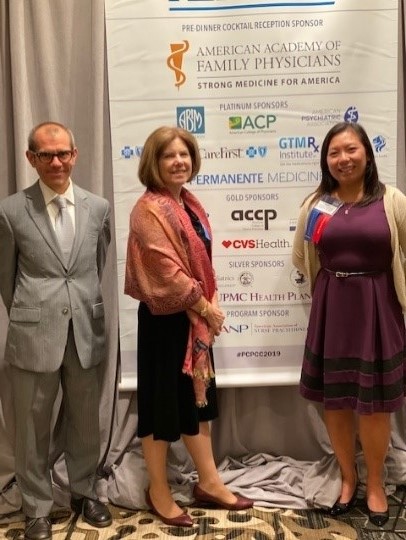As a founding member of the Pharmacist Provider Coalition (PPC), ACCP learned quickly that advocacy – like patient care – requires a team-based, interprofessional strategy.
Back in 2003, PPC unified a coalition of pharmacy organizations (AMCP, AACP, ACCP, APhA, ASCP, ASHP, and CPNP) to lobby for the introduction of legislation to recognize pharmacists as providers under Part B of the Medicare program. Introduced by Senator Tim Johnson (D-SD) in the 108th Congress, the legislation known as S. 1270: Medication Therapy Management (MTM) Act was referred to the Senate Finance Committee, where it collected cosponsors; however, the bill languished in committee and eventually died when that Congress adjourned sine die.
Of importance, however, this advocacy work in the early 2000s – though built around a naive focus on “provider status” rather than on coverage for services through benefit redesign – laid the groundwork for the inclusion of Part D MTM in the Medicare Modernization Act, which was signed into law in 2003.
Part D MTM, though fundamentally flawed in structure, was an important precedent for Medicare coverage for pharmacists’ clinical services. But the political decision to design the drug benefit under a structure of private sector stand-alone prescription drug plans also confirmed an important health policy reality – that Congress was unwilling to expand the traditional fee-for-service approach to Medicare spending.
All subsequent congressional actions related to Medicare since 2003, including those under the Affordable Care Act (ACA) and the Medicare Access and CHIP Reauthorization Act of 2015 (MACRA), have been positioned to transition Medicare payment toward team-based, bundled payments that prioritize primary care. Accordingly, all of ACCP’s advocacy efforts since the launch of its Medicare Initiative have strictly been aligned with this movement toward value-based care.
Primary Care Collaborative (PCC)
ACCP’s recognition over a decade ago that, to be successful in securing coverage for services, pharmacy must look beyond the profession and seek the support and endorsement of other members of the health care team led the College to its long-standing relationship with what was then known as the Patient-Centered Primary Care Collaborative (PCPCC), now simply the Primary Care Collaborative (PCC).
In 2010–2012, led by ACCP’s C. Edwin Webb, Pharm.D., the PCPCC Medication Management Task Force developed the groundbreaking comprehensive medication management (CMM) resource guide, Integrating Comprehensive Medication Management to Optimize Patient Outcomes, which has proven to be the cornerstone of the effort to define a consistent and replicable process of care around CMM.
PCC, considered by many the foundation of the patient-centered medical home (PCMH) movement, includes key stakeholders such as the American College of Physicians (ACP), the American Academy of Nurse Practitioners (AANP), Geisinger Health Plan, and Blue Cross Blue Shield Association, all of which, through their endorsement of the CMM resource guide, are known in Washington as CMM advocates.
Today, ACCP is proud to remain a key part of this innovative organization. Last year, the College facilitated a highly successful PCPCC webinar, Optimizing Value and Patient Outcomes Through Comprehensive Medication Management. ACCP also provides important financial support for PCC and, for several years, has sponsored a table at the prestigious Barbara Starfield Award dinner held at the Capital Hilton in downtown Washington, D.C., which recognizes excellence in advancing the medical home and person-focused care. Here are ACCP’s Washington, D.C., staff pictured at the event:

ACCP Staff at Barbara Starfield Award dinner (left to right): John McGlew, Director, Government Affairs; Marcia Buck, Pharm.D., FCCP, FPPAG, BCPPS, Director, Clinical Practice Advancement; and Kathy Pham, Pharm.D., BCPPS, Director, Policy and Professional Affairs.
Looking Forward
Moreover, earlier in 2019, the ACCP Board of Regents boldly decided to further invest in this collaborative approach to advocacy with the launch of the Get the Medications Right (GTMRx) Institute. GTMRx brings together some of the PCC thought leaders – including Paul Grundy, M.D., MPH, FACOEM, FACPM (formerly IBM’s chief medical officer) – in a multidimensional effort that engages key stakeholders to advocate to Congress, the Centers for Medicare & Medicaid Services (CMS), and other payers on the need for tools, data, practice standards, and implementation resources to advance medication optimization through team-based practice.
Getting the medications right through CMM has been ACCP’s top advocacy priority for more than a decade. For the first time, through its leadership in GTMRx, ACCP now welcomes colleague pharmacy organizations ASHP and AACP as partners in this advocacy initiative. However, like in clinical practice, the GTMRx approach to advocacy places the patient – not the pharmacist – first, as part of a multi-stakeholder vision to optimize outcomes and reduce costs through medication optimization.
In Case You Missed It: ACCP Submits Response to CMS Action Plan to Prevent Opioid Addiction and Enhance Access to Medication-Assisted Treatment
In response to a request by CMS for information to develop an action plan to prevent opioid addiction and improve access to medication-assisted treatment, ACCP submitted a statement highlighting its belief that opioid addiction is a chronic condition and that payers – including CMS – should cover patient-centered, team-based pain management accordingly.
To help advance patient-centered care models that transition Medicare payment policy for providers toward value of care and away from volume of services, ACCP urged CMS to include practices and programs that optimize the use of medications, such as comprehensive medication management (CMM), for patients with chronic conditions, including chronic pain and opioid use disorder (OUD). Click here to read the comments in full.